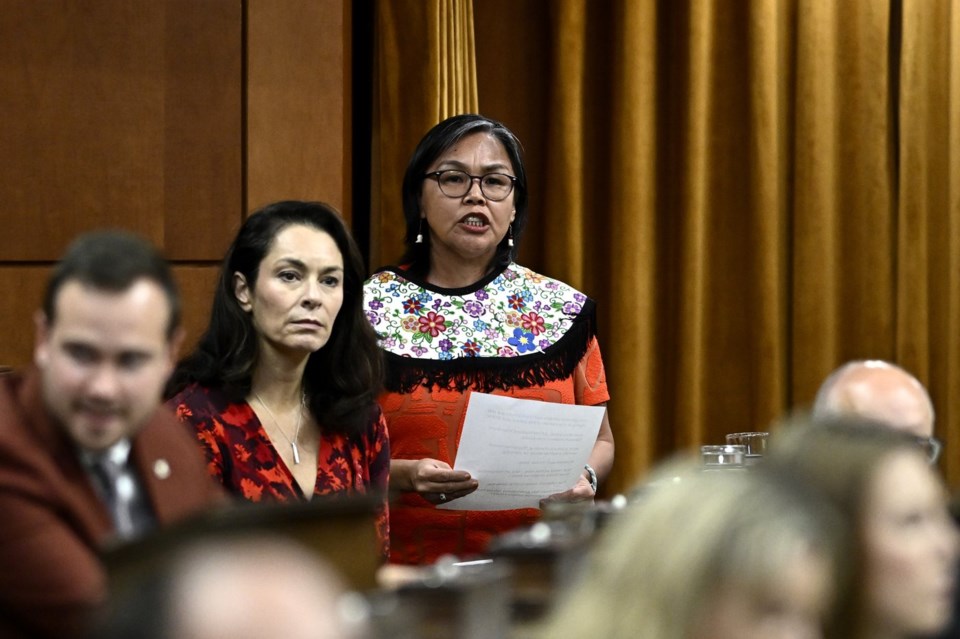ST. JOHN'S, N.L. — The member of Parliament for Nunavut is urging people in northern Labrador to complain directly to the federal government about food prices that have been described as inhumane.
NDP member Lori Idlout has been fighting in the House of Commons for an overhaul of the Nutrition North Canada subsidy program, which is aimed at offsetting transportation costs to remote Indigenous communities to lower the price of healthy food.
The subsidies seem to be particularly ineffective in Nain, N.L., where food prices more than doubled since the program was launched and are now among the highest in the country.
In a recent interview, Idlout had a clear message for people in Nain struggling to afford food: "Make complaints directly to the minister of Northern Affairs," she said, referring to Dan Vandal. "Obviously, complaining to the Northern Stores does not work."
Nain is home to about 1,200 people, and is one of five fly-in communities in Nunatsiavut, the Inuit region along Labrador's north coast.
Government figures show the price of a week's worth of healthy food to feed a family of four jumped by nearly 62 per cent in Nain between 2021 and 2011, the year the program began. It was the highest increase among reporting communities that qualify for the subsidies.
As of 2021, the cost of a week's worth of healthy food for four in Nain was $503, which is also the highest among the reporting communities.
Pictures on social media show the local Northern Store charging $7.97 for cabbage and $21.49 for a 1.42-litre bottle of Crisco cooking oil — prices Nain resident Rosie Harris has described as "inhumane."
The prices, Harris has said, force families to go hungry.
Lynn Blackwood, food security programs manager with the Inuit Nunatsiavut Government in northern Labrador, said the program is "obviously" not working and subsidy rates for Nain need to be adjusted.
The federal government is currently reviewing the program, and officials are set to visit Nain and Rigolet, N.L., early next year to speak with elders and community members about the cost of food.
"But I'm not sure how timely that review will be," Blackwood said. "I think we need action right now."
Inuit Tapiriit Kanatami, which represents about 70,000 Inuit in Canada, recommended an overhaul of the Nutrition North program in 2021, as part of its food security strategy for Inuit Nunangat, which is the Inuit region stretching from Yukon to Labrador.
A statement from the Department of Northern Affairs says the rise in food costs across the country and a 30 per cent increase in fuel and transportation costs helped drive food prices higher in Nain.
Food can be shipped into the town by boat in the warmer months or by plane in the winter, which is much more expensive.
During the COVID-19 pandemic, people bought more than usual from the town’s two stores. That meant the stores’ reserves of items shipped in by sea depleted faster, forcing retailers to resort sooner to costly air freight, Northern Affairs Department spokesperson Pascal Laplante said.
"(Nutrition North Canada) was not established to solve food security on its own," a previous email from the department said. "While NNC has been increasing access and lowering costs for food and everyday essential items in eligible communities, poverty and the high cost of living in the North are key drivers of food insecurity."
That response makes Blackwood feel like the department is trying to "pass the buck," but she is hopeful things can change.
"I'm really happy that they're going to actually come to the community and get a sense of what's happening," she said.
Yvonne Jones, Labrador's Liberal member of Parliament, did not respond to a request for an interview.
This report by The Canadian Press was first published Oct. 10, 2024.
— With files from Alessia Passafiume.
Sarah Smellie, The Canadian Press



